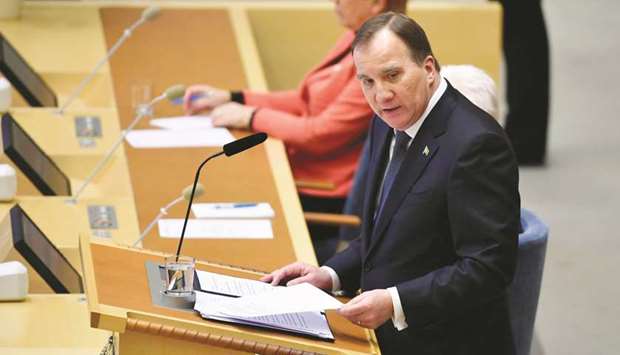Swedish Prime Minister Stefan Lofven named his cabinet yesterday, adding six new faces after securing a new term last week that ended four months of political stalemate.
He presented the coalition government’s policy statement to parliament, saying that “Sweden will not apply for membership of Nato”, the Western defence alliance.
Sweden would seek to “safeguard the transatlantic link, develop our defence co-operation, particularly with Finland, and deepen co-operation for increased security around the Baltic Sea”, he added.
Finance Minister Magdalena Andersson, Foreign Minister Margot Wallstom and Defence Minister Peter Hultqvist – all Social Democrats – were among the key ministers from the 2014-18 government that have been retained.
Greens co-leader Isabella Lovin kept the position as deputy prime minister, and was to handle climate and environment issues.
Despite few changes in the key line-up, Lofven nonetheless hailed the new government as “historic”, referring to the agreement that his Social Democrats secured with the Greens, the Centre Party and the Liberals to co-operate on the budget and other key bills.
The deal shifts the government’s parliamentary base towards the centre, with the Social Democratic Party no longer relying on the Left Party.
“This is a new era, a challenging and crucial era. The parliamentary co-operation that begins today is historic,” Lofven said.
At a brief news conference, he said the government would focus on “jobs, climate action, welfare and security”.
Mikael Damberg, who transferred from the post as minister for enterprise and innovation to become minister of interior, pledged that the government would “take on organised crime and gang shootings”.
The government transition was marked by a special session at the palace hosted by King Carl XVI Gustaf.
Crown Princess Victoria and parliamentary speaker Andreas Norlen were also present.
The speaker noted that his role in the government formation after the inconclusive elections in September was over.
One of the main tasks for the incoming government is to revise the shadow budget drafted by the conservative Moderate Party and Christian Democrats.
It passed in December with backing from the populist right-wing Sweden Democrats.
The Greens, junior partner in the coalition, have five cabinet posts, one less than in the former government, reflecting losses sustained in 2018.
Two of the new cabinet additions were from the Greens, including Asa Lindhagen who said she was committed to tackling so-called honour culture and oppression of minorities as minister for equality.
Hans Dahlgren, a veteran Social Democrat who has worked closely with Lofven and several of his predecessors and has held several key diplomatic posts such as UN ambassador, was to handle EU affairs, while former EU minister Ann Linde was to focus on trade and Nordic ties.
Dahlgren said there were a number of “important issues to take on in the EU, including Brexit, climate, migration and our [political] values”.
“Sweden must defend free trade,” the policy statement said.
Three members of the Social Democratic parliamentary caucus were appointed: Matilda Ernkrans, who was named minister for higher education and research, Jennie Nilsson takes over as agriculture minister, and group leader Anders Ygeman,
Ygeman, who was forced to resign as interior minister in 2017 over an IT outsourcing scandal, made a comeback as minister for energy and digitisation issues.

Lofven: This is a new era, a challenging and crucial era.
